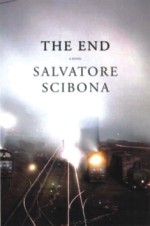|
Book Review
TheEnd
Anne Trubek
 In "The End," Salvatore Scibona has created a Yoknapatawpha County of sorts for Cleveland. Yoknapatawpha was William Faulkner's fictional territory in Mississippi. Scibona, who grew up in Cleveland, sets his debut novel in Elephant Park, a Murray Hillish Italian immigrant neighbourhood at midcentury. In "The End," Salvatore Scibona has created a Yoknapatawpha County of sorts for Cleveland. Yoknapatawpha was William Faulkner's fictional territory in Mississippi. Scibona, who grew up in Cleveland, sets his debut novel in Elephant Park, a Murray Hillish Italian immigrant neighbourhood at midcentury.
But do not expect a historical novel or a sentimental evocation of the city. Here is how the baker Rocco views Cleveland:
"He could see the thousand glittering lamps above the highway, the spires of the many churches, the mills expiring their sulfurous clouds, the rim of the lake to his right. The city was a mammoth trash heap -- even the lake was brown -- but it was an honorable place. It put pretty to one side. Nobody ever came here to have a good time. It was a place for people who had quit being children. It was a place to be employed for a period of a half century and thence to pass out of this life."
"The End" is not realist or plot-driven or historically faithful. It is not autobiographical. It is about Italians, but is no "Moonstruck." There are no loud family dinners over lasagna and salami. There are, in fact, no large families at all.
Instead there are separate, and separated, characters: a baker, an abortionist, a jeweler, a teenage boy. There is an event -- the Feast of the Assumption on Aug. 15, 1953 -- and intimations of racism and white flight -- that serve as the fulcrum around which the characters cohere.
Rocco, Ciccio, Lina and three others take turns narrating the book, their consciousnesses always taking precedence over action. Like Lina in this passage, they all struggle to belong:
"The spirit of the place pressed itself against her senses, but she was not the kind of creature that was capable of letting it in. . . . . She was separated, by virtue of being a conscious animal, from the rest of creation, which was unknowing and therefore complete, and therefore irrevocably real. The trees were both in the place and of it. But to know that one was here was to be an awareness amid the limitless unaware; it was to be in place but never of it, like a pearl in a cake."
"The End" is a throwback modernist novel. Scibona's subject is the meaning of place, time, consciousness, memory and, above all, language. Think not only Faulkner, but also T.S. Eliot, Virginia Woolf, Gertrude Stein and James Joyce.
Chronology is scrambled, italics represent streams of consciousness, and a character even asks, Prufrockian, whether he "dares stir the sugar in his tea."
Sometimes the book seems too faithful to its modernist masters -- even Scibona's method of composition is dated. He owns no computer and composes in longhand, then types on an Underwood manual typewriter, then revises and retypes, his Web site reports, "until fatigue and disillusionment set in." This atavistic ambition is off-putting and breathtaking.
But as Scibona settles in, and after the reader has stopped fighting this absent, lyrical author, the lusciousness of the prose takes over, soothing in a just-about-to-fall-asleep way. Scibona is trying, like the 15-year-old Ciccio, to evanesce, to disappear into his characters: "The snow was materialising out of nothing, and he wanted to do the trick in reverse."
All this stripping away makes for an empathetically melancholy book about immigrants shorn from their past. Pregnancies are terminated, sons cannot be conceived, mothers leave, violence occurs, and fathers wish to "get into the boy's dreams and trouble them."
Reading "The End" is akin to Ciccio's experience reading Thomas Aquinas: "I'll tell you what, I understand this just well enough to miss the point."
Missing the point is the point. Only by so doing can you find what Scibona wants us to see -- the paint layers showing through the run-down houses of Cleveland, the poetry in our place.
This review first appeared in the Cleveland Plain Dealer.
Copyright
(R) thedailystar.net 2008 |
